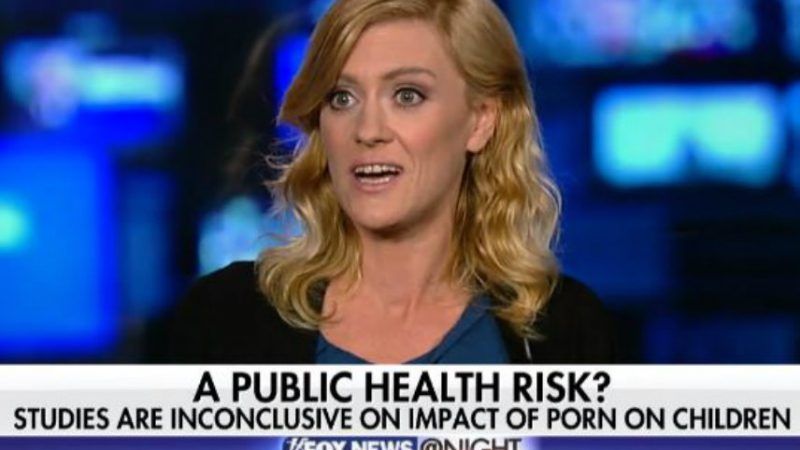Banning Porn Is a Bad Idea. Half a Century of Science Shows It.

Is porn fueling a "public health crisis?" That's the breathless and baseless worry spreading from Utah's legislature to other statehouses (most recently, Florida and Kansas) and the pages of papers like The New York Times. These latest legislative freakouts are part of a rich history of government ignoring science and common sense in an emotional crusade against pornography, be it in the form of photos or cable movies or internet clips.
I talked with Fox News correspondent Ellison Barber about the issue last night on Fox News @ Night:
I was on @foxnewsnight last night talking to @ellisonbarber about porn being a "public health crisis." Check it out: pic.twitter.com/xrg8DvFqeT
— Elizabeth Nolan Brown (@ENBrown) February 20, 2018
I also wrote last week for Buzzfeed about how would-be porn prohibitionists such as Times columnist Ross Douthat are part of a long, dumb, and dishonorable tradition—one that always tries to claim that
this time it's different—that whatever new medium exists for producing or distributing porn is uniquely dangerous to the youth and degrading to good women.
For decades now, this supposed difference has been chalked up to the proliferation of online pornography. Though the 1970s and '80s panic over porn had begun to simmer down by the early '90s, the advent of the internet fueled its slow burn back into a full-scale boogeyman.
A 1997 op-ed from Cox News Services fretted over "cybersmut" being easily accessible to teens on their home computers. "For the first time, collectors of deviant material" have a "free place to trade and barter," cautioned one activist. And the new wave of amateur porn was "especially dangerous for children."
Just as earlier fears that novels, nudie mags, and Skinemax would ruin our youth have proved unfounded, there's no evidence that internet porn has been destroying millennials—some of whom now have two decades of post-high-school (and first-porn-viewing) data to offer.
Read the whole thing here. Two presidential study commissions have found no reason to panic about porn. "Exposure to pornography during adolescence had little effect on persons who later became rapists and child molesters," reported the Associated Press, 48 years ago, on the first commission's findings.
"One's family background and his current attitudes…seem much more likely to determine his sexual behavior" than access to porn, reported researchers Harold S. Kant and Michael J. Goldstein in a Psychology Today piece about their work. In fact, "normal adults…reported more experience with pornography as teenagers than any deviant group we studied and, as adults, they continue to see more erotica than sex offenders do."
The AP explained that "sexual deviates generally came from homes where pornography was restricted and sex was never discussed," and "most deviates had been severely punished as teenagers by their parents when caught with pornographic material."
The federal commission recommended against a porn ban. But the Nixon administration disavowed the report, and the Senate voted on a resolution condemning it as "unscientific." Neither offered any substantive critique of the scientists' work or any reasons to think the research was deficient; it simply didn't fit with their political aims and was thus reflexively rejected as fake news. A Reagan-era commission also found few links between porn consumption and social harm, concluding that watching pornography is "predominantly harmless"; it too was ignored by officials who found its conclusions inconvenient.
Again and again, the power of scientific study seems no match for the power of political propaganda. But as Reason's Peter Suderman wrote last week, "prohibition never works, and internet smut is no exception."
A new paper from psychologist David Ley tackles "the pseudoscience" behind porn health crisis legislation. "There are people who are experiencing challenges integrating pornography into their life," writes Ley. "Unfortunately, the label of porn addiction is commonly thrown at these individuals in a manner which feeds moral panic, diverts attention and resources from effective, evidence-based strategies to support these individuals," and "pathologizes otherwise-benign behaviours."
Labeling people "porn addicts" (and, presumably, collectivizing this pathology to spell the sexual doom of entire generations) "increases the sense of hopelessness that individuals struggling with their porn use experience," concludes Ley.
It takes our focus away from the person, places it on pornography, and ignores the user's social, religious, and personal contexts. Alternative strategies for supporting these individuals include: providing greater sexual education; helping them to understand the origin of their struggles; assisting them to evaluate and reconcile their moral beliefs with their sexual behaviours; assisting them in learning how to communicate and negotiate around sexual needs and desires; addressing empathy within relationships; enhancing impulse control and mindfulness; and educating them about ways to achieve sexual health. To assist most effectively, we must evaluate and consider those contextual variables, and allow them to guide our individual, therapeutic, and public responses.
We talked to Republican National Convention delegates in 2016 about their party's official platform declaring porn a public health crisis. Almost without exception, those we talked to said they wished elected officials would spend less grandstanding about social issues like this and more time on fixing problems with our health care system and economy.


Show Comments (78)